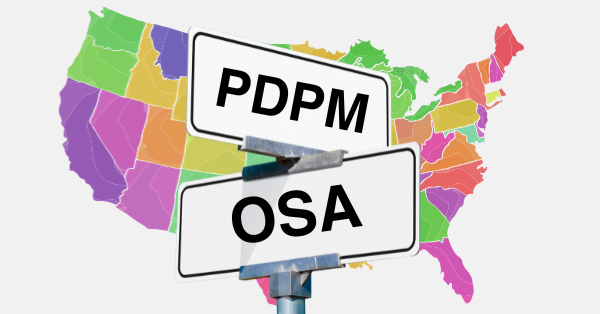As of Oct. 1, 2023, the Centers for Medicare & Medicaid Services (CMS) has retired the A0300 Optional State Assessment (OSA) from the federally required MDS 3.0 v1.18.11 that is submitted by nursing facilities. The OSA is now a separate optional MDS assessment that may be completed at the discretion of each state’s government. The OSA is used by State Medicaid Agencies to calculate a case-mix score. States have the option to utilize the OSA for the collection of RUGS data pertinent to the calculation of a Case Mix Index Score and SNF Medicaid Reimbursement. Most states that utilize a Case Mix Index in their SNF Medicaid reimbursement methodology are opting to use the OSA.
What is the OSA?
The OSA is a 20-page assessment that utilizes RUG (Resource Utilization Group) III and RUG IV case-mix groups. With the updated MDS 3.0 RAI User’s Manual v1.18.11, several sections and items have been removed – including A0300, D0200, D0300, G0110, K0510, O0100, O0450, O0600, O0700, and X0570. These items were used to calculate the RUG III and IV case mix groups.
What does this mean for nursing facilities?
State Medicaid Agencies had to decide their course of action on or before Oct. 1, 2023. Therefore, nursing facilities must now determine which payment system their state chose: (a) the OSA for Medicaid reimbursement or (b) a transition to PDPM (Patient Driven Payment Model) using the MDS 3.0 v1.18.11 for reimbursement.
Not only have states had to determine their use of the OSA, but also the accompanying OSA requirements of completion. States could, for instance, require with each federal OBRA MDS completion (such as a comprehensive, quarterly, or significant correction of comprehensive and quarterly assessment) that an OSA needs to be completed using the same ARD (Assessment Reference Date).
For example, North Carolina now requires (effective 10/1/23) the completion of an OSA with each federal OBRA and PPS assessment. OSAs must be completed concurrently with the OBRA and PPS assessments, and not be completed as “stand alone” assessments. The OSA is required to be submitted along with the federal OBRA and or PPS assessment to the iQies/ASAP system regardless of payor source (this would not include managed care or insurance).
If the OSA is not set for the same date as the federal OBRA MDS, the assessment may be deemed delinquent. If this is the case, the assessment would be excluded from MDS processing, would not be included in the Case Mix Index, and would not figure into the facility’s Medicaid reimbursement. In this example, if an OSA is submitted without a federally required assessment then the OSA will not be considered for valid reimbursement.
What should nursing facilities be doing now?
Nursing facilities should stay in contact with their state RAI (Resident Assessment Instrument) Coordinator and/or State Medicaid Agency for instructions regarding the changes that went into effect Oct. 1, 2023. They must understand the requirements related to the completion of an OSA or the transition to PDPM in order to be compliant for MDS completion and submissions – which can ultimately impact their reimbursement.
Nursing facilities need to monitor their software for errors and glitches that can affect MDS completion requirements and coding. The facility should assign a person responsible for contacting the state RAI Coordinator (such as the Nurse Assessment Coordinator) and stay up to date with monitoring updates from the State Medicaid Agency. The Nurse Assessment Coordinator and other members of the IDT (Interdisciplinary Team) should continue with ongoing education, and training within a facility should be required as the processes change frequently. The nursing facilities can continue to monitor the transition within the facility using a systematic process through their QAPI/QAA process.
